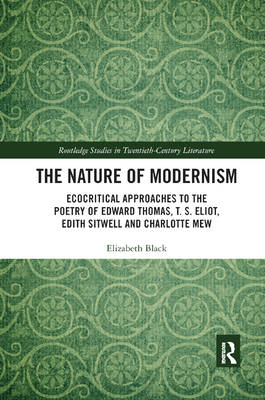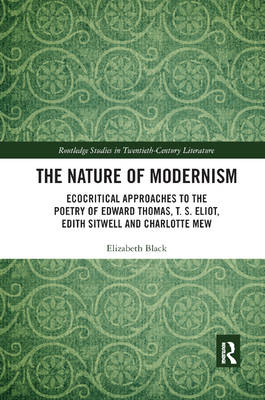
- Afhalen na 1 uur in een winkel met voorraad
- Gratis thuislevering in België vanaf € 30
- Ruim aanbod met 7 miljoen producten
- Afhalen na 1 uur in een winkel met voorraad
- Gratis thuislevering in België vanaf € 30
- Ruim aanbod met 7 miljoen producten
The Nature of Modernism
Ecocritical Approaches to the Poetry of Edward Thomas, T. S. Eliot, Edith Sitwell and Charlotte Mew
Elizabeth BlackOmschrijving
This books presents the first extended study of the relationship between British modernist poetry and the environment. Challenging reductive associations of modernism as predominantly anthropocentric in character and urban in focus, the book's central argument is that within British modernist poetry there is a clear and sustained interest in the natural world which has yet to receive adequate critical attention. Whilst modernist studies continues to emphasize the plurality of the movement and the breadth of voices and concerns within it, the environmental consciousness of modernist literature and its response to changes to human/nature relations following the experience of war and modernity remain largely unexamined. Exploring British modernist poetry from an ecocritical perspective offers a fresh approach to the movement and its context, and produces original readings of both canonical and more marginalized modernist voices. This book opens by discussing the relationship between modernism and ecocriticism and the benefits of creating a dialogue between the two. It then presents new readings of Edward Thomas, T. S. Eliot, Edith Sitwell, and Charlotte Mew that reveal a shared preoccupation with environmental issues and a common desire to find new ways of achieving physical, psychological, and artistic reconnection with nature. Building on the continuing growth of ecocriticism, this book demonstrates how green approaches to modernist studies can produce new insights into both individual poets and the modernist movement as a whole, making it an essential resource for students of modernism, ecocriticism, and early-twentieth-century literature.
Specificaties
Betrokkenen
- Auteur(s):
- Uitgeverij:
Inhoud
- Aantal bladzijden:
- 222
- Taal:
- Engels
- Reeks:
Eigenschappen
- Productcode (EAN):
- 9780367886059
- Verschijningsdatum:
- 10/12/2019
- Uitvoering:
- Paperback
- Formaat:
- Trade paperback (VS)
- Afmetingen:
- 152 mm x 229 mm
- Gewicht:
- 317 g

Alleen bij Standaard Boekhandel
Beoordelingen
We publiceren alleen reviews die voldoen aan de voorwaarden voor reviews. Bekijk onze voorwaarden voor reviews.











